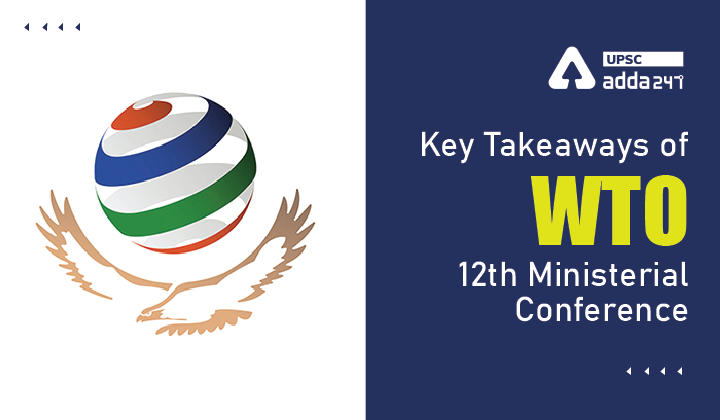Table of Contents
WTO 12th meeting: Relevance
- GS 2: Bilateral, regional and global groupings and agreements involving India and/or affecting India’s interests
WTO ministerial conference: Context
- Recently, 12th WTO Ministerial Conference 2022 concluded in Geneva where a number of deals relating to many issues including waiver of COVID 19 vaccines, food security, was signed.
WTO 12th Ministerial Conference: Key takeaways
Curbing fishery subsidies
- In the recently concluded meeting, WTO passed a multilateral agreement that is aimed at curbing ‘harmful’ subsidies on illegal, unreported and unregulated fishing for the next four years.
- Objective: Better protection of global fish stocks.
- Significance: Since 2001, member states have been negotiating the banning of subsidies that promote overfishing.
- First time there is an agreement in WTO that is aimed at environmental sustainability.
- It caters to the needs of the livelihoods of the 260 million people who depend directly or indirectly on marine fisheries.
- India: India successfully lobbied with other like-minded nations to remove a section of the proposal that would threaten some subsidies which would assist small-scale artisanal fishing.
- Artisanal and traditional farmers would not face any restrictions under this agreement.
Global food security
- Member nations have agreed to a legally binding agreement to exempt food purchased by the UN’s World Food Programme (WFP) for humanitarian purposes, from any export restrictions.
- Why needed? Due to global food shortages and rising prices caused by the war between Ukraine and Russia.
- However, countries would be allowed to restrict food supplies to ensure domestic food security needs.
- India: India’s demand to allow it to export food from its public stockholdings to other countries will be discussed in the next Ministerial Conference in 2023.
E-commerce
- All member nations agreed to continue the moratorium on custom duties on e-commerce transmissions until the subsequent Ministerial Conference.
- Significance: WTO members had first agreed to not impose custom duties on electronic transmissions in 1998. However, internet was relatively new at this point of time.
- Since then, the moratorium has been periodically extended.
- Issue: From 2017-2020, developing countries lost a potential tariff revenue of around $50 billion on imports from only 49 digital products.
- India: India has asked WTO to review the extension of the moratorium on custom duties on e-commerce transactions as developing countries faced the brunt of the financial consequences of such a moratorium.
COVID-19 Vaccine production
- WTO members agreed to temporarily waive intellectual property patents on Covid-19 vaccines without the consent of the patent holder for 5 years.
- Objective: To ease the manufacture the vaccines domestically.
- Significance: It will contribute to ongoing efforts to concentrate and diversify vaccine manufacturing capacity so that a crisis in one region does not leave others cut off.
- Issue: The agreement has been opposed by the rich pharmaceutical companies as they argue that IP’s do not restrict access to Covid vaccines.
WTO related news for UPSC





 TSPSC Group 1 Question Paper 2024, Downl...
TSPSC Group 1 Question Paper 2024, Downl...
 TSPSC Group 1 Answer key 2024 Out, Downl...
TSPSC Group 1 Answer key 2024 Out, Downl...
 UPSC Prelims 2024 Question Paper, Downlo...
UPSC Prelims 2024 Question Paper, Downlo...
